- Home
- Donis Casey
Forty Dead Men
Forty Dead Men Read online
Forty Dead Men
An Alafair Tucker Mystery
Donis Casey
Poisoned Pen Press
Copyright
Copyright © 2018
First E-book Edition 2018
ISBN: 9781464209406 ebook
All rights reserved. No part of this publication may be reproduced, stored in, or introduced into a retrieval system, or transmitted in any form, or by any means (electronic, mechanical, photocopying, recording, or otherwise) without the prior written permission of both the copyright owner and the publisher of this book.
The historical characters and events portrayed in this book are inventions of the author or used fictitiously.
Poisoned Pen Press
4014 N. Goldwater Boulevard, #201
Scottsdale, Arizona 85251
www.poisonedpenpress.com
[email protected]
Contents
Forty Dead Men
Copyright
Contents
Dedication
Cast of Characters
Chapter One
Chapter Two
Chapter Three
Chapter Four
Chapter Five
Chapter Six
Chapter Seven
Chapter Eight
Chapter Nine
Chapter Ten
Chapter Eleven
Chapter Twelve
Chapter Thirteen
Chapter Fourteen
Chapter Fifteen
Chapter Sixteen
Part II
Chapter Seventeen
Chapter Eighteen
Chapter Nineteen
Chapter Twenty
Chapter Twenty-one
Chapter Twenty-two
Chapter Twenty-three
Chapter Twenty-four
Chapter Twenty-five
Chapter Twenty-six
Chapter Twenty-seven
Chapter Twenty-eight
Chapter Twenty-nine
Chapter Thirty
Chapter Thirty-one
Chapter Thirty-two
Chapter Thirty-three
Chapter Thirty-four
Alafair’s Recipes
More from this Author
Contact Us
Dedication
For my own personal veterans, with love.
Carl D. Casey, USMC 1942-1945, South Pacific
Larry Hull, USN, 1964-1969, Vietnam
Joseph R. Potter, USA, 1997-1999, 2001-2004, Iraq
Leah Irizarry, USA, 2007-2015, South Korea
Map
Cast of Characters
Alafair Tucker—Mother of ten, who would do anything for her children
Shaw Tucker—Her husband, who would also do anything for his children
Their Children
Martha McCoy—age 27, and Major Streeter McCoy, her husband
Mary Lucas—age 26, and Sergeant Kurt Lucas, her husband
Judy Lucas—age 3, their daughter
Alice Kelley—(Phoebe’s twin) age 24, and Walter Kelley, her husband
Linda Kelley—almost age 3, their daughter
Phoebe Day—(Alice’s twin) age 24, and John Lee Day, her husband
Zeltha Day—age 4, their daughter
Tucker Day—age also not quite 3, their son
George H. Day—age 6 weeks
Lieutenant George W. Tucker, known as Gee Dub, recently mustered out of the Army—age 22
Ruth Tucker—age 20, and Trenton Calder, her intended
Private Charlie Tucker—age 18
Blanche Tucker—age 13
Sophronia Tucker—age 12
Grace Tucker—age 6
Other Members of the Family
Chase Kemp—age 9, Alafair’s nephew and ward
Scott Tucker—the law in Boynton, Oklahoma, Shaw’s cousin
Charles Tucker—Shaw’s brother
Lavinia Tucker—Charles’ wife
Sally McBride—Shaw’s mother
Peter McBride—Shaw’s stepfather
Other Folks Who Must be Dealt With
Daniel Johnson—dead
Harvey Stump—also dead
Holly Thornberry Johnson—Daniel’s widow
Pearl Evans Johnson—also Daniel’s widow
Lucy Johnson—Daniel’s mother
Fern Johnson—Daniel’s father
Bertram Evans—Pearl’s father
Leon Stryker—Pearl’s fiancé
Private Richard J. Moretti—from Gee Dub’s unit in France
Lieutenant Nigel Anderson—a British officer
Sharma—Anderson’s batman
Abner Meriwether—the lawyer
Amos Gundry—the U.S. Marshal
Granny Murray—saw what happened
Joan McNamara—heard things
Chief Bowman—Chief of Okmulgee Police Department
Critters
Penny—Gee Dub’s chestnut mare
Charlie Dog, Bacon, Buttercup, Crook—the family dogs
Various cats, a goat, and Gregory the Duck
Chapter One
December 1918
Scott Tucker, constable for the town of Boynton, Oklahoma, was glad to have his deputy back. His eldest son, Slim Tucker, had made an adequate fill-in deputy while Trenton Calder was away on a ship in the North Atlantic, fighting the War to End All Wars, but Slim was an oilman down to his toes, and though he had done his duty to his father, his heart hadn’t been in it. Slim was now back surveying for the Pure Oil Company, where he belonged, and Trent had donned his badge again.
The only problem was that Trent wasn’t going to last. Trent had been content to work for Scott for little more than room and board and pocket money when he was innocent and footloose and barely out of his teens. But now Trent was twenty-four years old, had seen the world, and was soon to be married to Scott’s young cousin once-removed, Ruth Tucker. As soon as Trent returned to work, he had informed Scott that the arrangement was only temporary, just until he could find a job that would actually support himself and a wife. Or until Scott could find another adventuresome youngster who was too dumb to know better than to take on the job.
Trent had always been a serious young man, and that had certainly not changed after his stint in the Navy. In fact, he was even more inclined to keep his own counsel since his return. Scott knew better than to ask him what had happened to him while he was at sea. Trent didn’t volunteer any information. He only said that if he never again saw a body of water bigger than a farm pond, that would suit him just fine.
Scott knew that he was not going to find an experienced replacement deputy—he was going to have to find a green boy and raise him himself, like he had done with Trent. The thought made him tired. In fact, ever since he had gotten over the bout of Spanish flu that had afflicted him the previous fall, Scott didn’t much have the energy for anything. Over the past few months, he had been thinking of telling the town council that they should start looking for someone else to keep the peace in Boynton. Perhaps the town had become big enough to hire a marshal, or request that the county assign a real deputy sheriff to the area.
He was sitting at his desk in the jailhouse on a fine December morning, pondering that very notion, when Trent came in from his rounds.
“Clelland Rogers and his wife found a dead soldier,” Trent said, without even a how-do-you-do.
Scott looked up, startled. “What’s this?”
Trent hooked his thumbs in his belt and shifted his weight to one foot. “They was driving in from Muskogee when Clel felt the call of nature and went off behind a tree about a mile and a half east of town. He says he seen a boot sticking out from behind a bush and went over to investigate. That’s when he found him. Still in his uniform and all. Mindy tells me Clel thinks the soldier has been dead for a spell.”
Scott had stood and was retrieving his gun belt from his top desk drawer. “Where is Clel now?”
“He’s still out there. Mindy came on into town to let us know. Clel stayed out there so we could find the place again.”
They spotted Clel sitting on a stump by the side of the road some distance east of town. He stood up when he saw the auto approaching and moseyed out to meet them with a smile. Finding a dead body didn’t seem to have spoiled his day. But that was Clel. Scott had known Clel Rogers all his life—a tall, good-natured man, untroubled by deep thought. He had taken over his father’s furniture store when Clel Senior retired, and had married a local girl a few months earlier. He was an innocuous fellow, and an honest-enough businessman, with thinning blond hair, a round face and jug ears, and the pasty complexion of a man who spends too much of his time indoors. How he had convinced a pretty girl like Mindy to marry him was something of a puzzle to Scott.
Clel pointed to the shrubbery several feet back from the road. “Body’s over yonder.”
They followed him through the tall grass to a clump of sumac bushes on the side of a little hill. They could smell the soldier before they could see him, so Scott was relieved to see that the body was still in fair shape. The face was blue-tinged, and the soldier had suffered a bout of vomiting and diarrhea before he met his maker. Scott figured he was probably walking along the road when the influenza overcame him and he crawled off into the grass to be sick. The influenza epidemic that year had already killed millions around the world.
He turned to Trent. “Son, go to the car and bring me that blanket to cover him up.” Scott was not worried about infection since he had recently recovered from the flu himself. But he was not happy about having to go through the man’s pockets. There was not much in them. No money, no bag that they could find. He did have a military ID in the front breast pocket of his tunic, and a worn identity disc in a trouser pocket.
The photo in the ID was of a bemused-looking young man whose new military haircut left him practically bald, except for a dark topknot that stuck straight up, as though he had poked a finger in an electric light socket. His home address was in Okmulgee. Scott sighed. The poor son-of-a-gun had made it through the war, only to die of the flu eighteen miles from home.
Chapter Two
February 1919
Alafair Tucker finally found the time to do some cleaning in the bunk room at the back of the toolshed. Mop the floor, dust, pick up the dirty laundry off the floor, make the bed. She didn’t know where Gee Dub was. He didn’t bother to keep anyone apprised of his whereabouts these days. Certainly not his mother. Of course, he had just been discharged from the Army and only been home for less than a week. He had not had time to settle into a routine. When he first stepped off the train at the Boynton station, he had made it plain to his folks that he could use a few days to rest and do nothing before deciding what to do with the rest of his life. He had been studying agriculture at Oklahoma A&M before the war started and he volunteered for the Army before he could be drafted. But he had told his parents that after his year in Europe, he was not at all sure he would be able to pick up where he left off, as though nothing had happened.
Of course, if Gee Dub did decide to work the family farm again, helping raise and train horses and mules, his father would have to pay him. Gee Dub was twenty-two years old. He’d gone to Europe to fight the Hun. He could no longer be expected to be one of Shaw Tucker’s unpaid child labor force.
Gee Dub had changed. No one other than Alafair seemed to be aware of it, but she knew it was true. To everyone else, friends and family alike, Gee Dub was still the quiet, sharp-eyed, good-natured young man with the wry sense of humor that he had been before he shipped out for France. His siblings thought he was the same, and even Shaw told Alafair that he couldn’t see what she was talking about. But Alafair knew.
The entire family had been waiting for him when his train arrived at the Boynton station on Monday-before-last. “Where’s Gee? Where’s Gee?” Grace kept asking, as several people disembarked—a well-fed couple verging on elderly, a young lady. A soldier caused a momentary stir, until they recognized him as Johnny Turner, son of the owner of the livery stable.
“Gee Dub’s right behind me,” Johnny called to the Tuckers with a wave, before his own mother and father enveloped him and swept him away.
Then a second man in uniform stepped down onto the platform. He was tall and dark like Gee Dub, and had a peculiar twisty smile like Gee Dub’s, too. But Alafair was taken aback when all the siblings rushed at this unknown soldier. He looked like Gee Dub, but there was something so different about his eyes that she hadn’t recognized him. Her own firstborn son.
“Hello, Mama,” he had said, and Alafair had finally seen him with her heart. Yes, he was hers, but he was not entirely the same young man who had left Boynton for Fort Reilly from this very station in 1917.
It was true that he didn’t behave differently. He laughed and played with the grandchildren and the dogs and teased his sisters. He ate like there was no tomorrow. He sat with the family after supper and sang and played his guitar and told stories, as he always had done. He took up residence in the toolshed bunk room behind the barn, just where he had been living before he left for basic training. But sometimes a faraway look would come over his face and, even though his body was still there, Alafair saw that his soul was somewhere else. Every day since his return, he would saddle his chestnut mare, Penny, after dinner and disappear until suppertime. He never said where he was going. Alafair thought he probably didn’t know himself. He didn’t go to town, or Alafair would have heard from someone who had seen him. Shaw told her he more than likely rode into the country to be alone and get himself oriented to civilian life again.
Alafair had scrubbed and prettified the bunk room behind the barn to a fare-thee-well when she first knew that he was coming home for good, but until today she had not had a minute to clean since he had taken up residence. Her middle daughter, Ruth, was to be married in a few weeks now that her betrothed, Cousin Scott Tucker’s red-haired deputy Trenton Calder, was home from the Navy, and Alafair had been spending most of her rare free moments sewing on a trousseau.
But it had been nearly a week since she had cleaned up after Gee Dub, and she couldn’t put it off any longer. She had no idea what his stint in the Army had done for Gee Dub’s housekeeping skills. He had spent the bulk of his time overseas living in a muddy trench, which had probably increased his tolerance for dirt.
Alafair’s fourth daughter, Phoebe, was visiting today with her three little children. Phoebe’s youngest, George H. Day, had been born only six weeks earlier and was a source of endless amusement and fascination to his older siblings, Zeltha and Tuck. No one ever called the baby anything other than George H., which may have been a pretty fancy handle for such a wiggly little tadpole, but the extended Tucker family boasted so many Georges that this new generation of parents had to scramble to come up with ways to designate which one belonged to whom.
Dinner was over and the men had gone back to work. Alafair was on the back porch washing out a couple of diapers when she saw Gee Dub ride off toward the woods. She wrung out the diaper she was holding and hung it over a line strung across the porch before hurrying back into the house to retrieve her mop, bucket, rags, and a set of fresh sheets. After directing Grace, her six-year-old, to help with the little ones, she left Phoebe and the children in the kitchen giving George H. his dinner, and headed out to the bunk room.
She had no compunction about invading Gee Dub’s privacy.
She had always cleaned the bunk room, no matter who was living there, and Gee Dub was certainly aware of that. If he had something to hide, he would have taken up residence somewhere else.
***
The bedroom that had been carved out of part of Shaw’s toolshed was basic, but comfortable. The furniture was recycled and threadbare, yet serviceable. The two iron bedsteads sported relatively new horsehair mattresses, tufted to hold the filling in place and the edges hand-stitched together. A painted wooden table with two chairs sat in the center of the room. A washstand with a pitcher and chipped basin, small chest of drawers, and a Franklin stove in one corner completed the furnishings. The one window on the back wall was covered by curtains that Alafair had made from two of her old calico aprons.
She leaned over to strip the sheets off the bed Gee Dub had been using, and hesitated when she saw that he had placed two small yellow boxes under his pillow. Rifle cartridges. She blinked at the boxes before she picked them up. One box was empty, and the weight and forlorn rattle within told her that the other was nearly so. She sat down on the edge of the bed and slid the box open to find one cartridge.
One bullet left.
On Gee Dub’s eighteenth birthday, his father had given him his own Springfield rifle. Gee Dub loved that firearm, and it had broken his heart when he was forced to leave it at home when he went to the Army. The boxes under the pillow were U.S. Army-issue, once containing twenty cartridges each, .30-06 Springfield, steel-tipped. Gee Dub’s own rifle used the same type of ammunition.
Alafair regarded the solitary remaining cartridge for some minutes, mulling over the possibilities. Why would Gee Dub keep two practically empty boxes for military ammunition under his pillow? Did he sleep on them? It wouldn’t be a very comfortable arrangement if he did. The empty boxes must mean something to him, and Alafair did not like to think about what that could be. He had been a riflery instructor at Camp Funston in Kansas for the first six months after his OCS training before he had been shipped off to France with his unit, where he had been in command of his own frontline platoon. The family knew that he and his men had been in the trenches for a few months, but then Gee Dub had been pulled off the line and assigned to a British unit to carry out some sort of special detail. He had just been transferred back to the Americans when the war ended. He had spent only a few more weeks in France before he was sent back to the States to be mustered out. She didn’t know the particulars of his service. He had never said.

 The Wrong Girl
The Wrong Girl Valentino Will Die
Valentino Will Die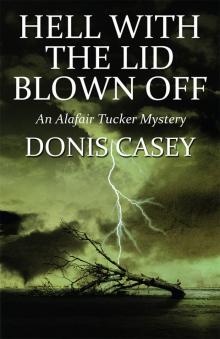 Hell With the Lid Blown Off
Hell With the Lid Blown Off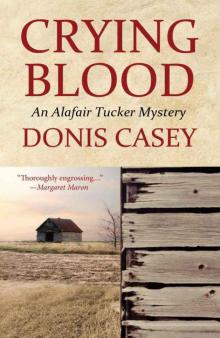 Crying Blood - An Alafair Tucker Mystery
Crying Blood - An Alafair Tucker Mystery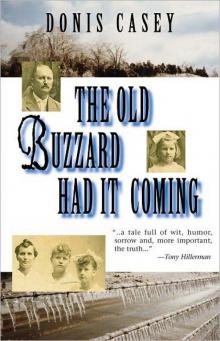 The Old Buzzard Had It Coming: An Alafair Tucker Mystery
The Old Buzzard Had It Coming: An Alafair Tucker Mystery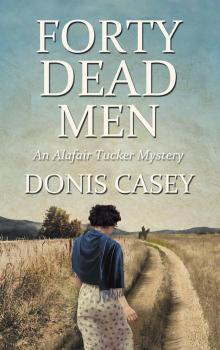 Forty Dead Men
Forty Dead Men All Men Fear Me
All Men Fear Me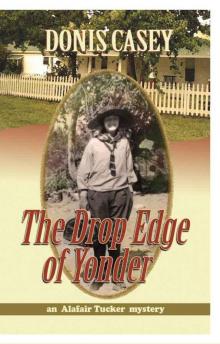 The Drop Edge of Yonder - An Alafair Tucker Mystery
The Drop Edge of Yonder - An Alafair Tucker Mystery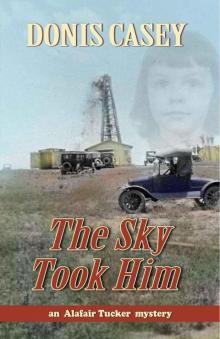 The Sky Took Him - An Alafair Tucker Mystery
The Sky Took Him - An Alafair Tucker Mystery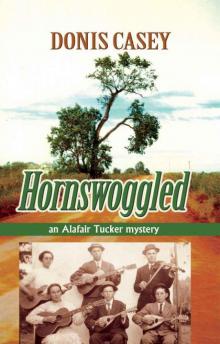 Hornswoggled - An Alafair Tucker Mystery
Hornswoggled - An Alafair Tucker Mystery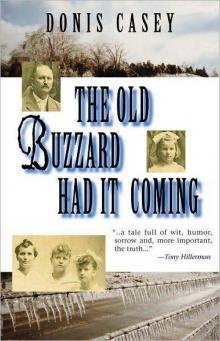 The Old Buzzard Had It Coming
The Old Buzzard Had It Coming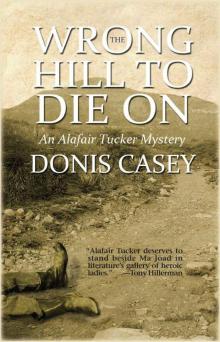 The Wrong Hill to Die On: An Alafair Tucker Mystery #6 (Alafair Tucker Mysteries)
The Wrong Hill to Die On: An Alafair Tucker Mystery #6 (Alafair Tucker Mysteries)